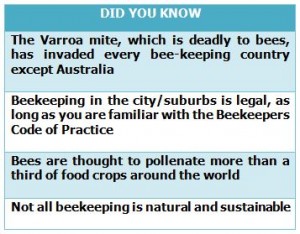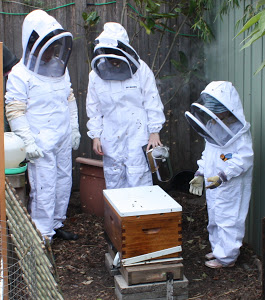Bees and honey would normally go hand in hand, but for Melbourne’s Natural Beekeeping Group the honey is just a bonus.
In January 2011, Andrew Janiak thought beekeeping could be improved, so he started the Natural Beekeeping Group, or Perm-apiculture Group, as part of Permaculture Melbourne. It is becoming more and more popular in Melbourne with hundreds of people taking up the sustainable backyard hobby.
“I thought that it is worth promoting beekeeping which on one hand is bee-friendly and nice and easy, on the other hand is low cost and simple,” he says.
“It’s more about treating them in a gentle way and not doing things that may give you another kilo of honey and be very harmful to the bees, they are nice creatures after all.”
The group’s vision is based around the idea that humans should be participants, not managers in the honey bees’ lives. For them, being a good beekeeper is about having happy bees.
“(We are) doing it the permaculture way allowing for the general permaculture philosophy, which is to be easy on the land and easy on whatever grows there, and trying to find a sensible balance,” Mr Janiak says.
“I grew up in Europe in the Communist Bloc and the mantra of the days was human fighting against nature, now in the Soviet Union who lost? Nature lost.”
“I don’t believe in fighting with nature. I believe in having a very soft and small footprint on the surface of the earth. I’m a softy at heart.”
Secretary Claire Coutts says the key to happy bees is a varied diet containing pollen and nectar.
“One of the big problems with commercial beekeeping is a lot of the beehives are used for pollenating crops,” she says.
“The commercial beekeepers will take them to say an almond orchard and all the bees eat for three weeks is almond pollen, it’s a bit like eating McDonalds every day for three weeks, hamburger, hamburger, hamburger.”
“So they are getting a monoculture diet, whereas our bees are get a varied diet, so that keeps them a bit happier and a bit healthier I’d hope.”
Future uncertain for Aussie honey bees
Bees are needed for the pollination of many plants, including fruit and vegetables and Ms Coutts says we would be “in a bit of deep doo-dah” without them and a number of essential foods would not be able to reproduce.
The Varroa mite, a parasite that can wipe out 80 per cent of a colony, has invaded every beekeeping country except Australia and experts say it is only a matter of time before it appears here.
Through methods like locating hives over a wider area to prevent the mite from spreading, the natural beekeepers hope to maintainsustainable supplies of bees.
“By using some of our methods, we had to build the bees to have better resilience to deal with the Varroa mite without using miticides and other chemicals in the hive,” Ms Coutts explains.
“We’ve seen with humans that people build up resistance to things like antibiotics and we’re hoping that our methods will not lead to bees that are resistant and weakened.”
In fact, there are many similarities between bees and humans.
“I am a married man, I have minor experience with ladies, you have to allow for bad days and good days,” Mr Janiak admits, not wanting to make a sexist remark. “Drones (males) don’t sting, the stinging ones are only females, they have good days and bad days; I’m not joking.”
It could be the weather, or food availability, or the threat of wasps, but sometimes the bees will wake up on the wrong side of the hive.”
“There are days you come to the hives and they are after you like you wouldn’t believe it. The best way is to turn around, go away, come another day,” Mr Janiak says.
“If you try to persevere, they’ll get you one way or the other. If it’s a nice sunny day, there are lots of flowers around, they don’t mind if you mess with them.”
Honey, I’m home
Mr Janiak has a simple method for collecting honey.
“When I want to turn comb into honey, I take a few bits from my wife’s kitchen utensils and that’s all I need and I don’t spend any money on it,” he says. “Out of a single hive in your backyard in Melbourne, in a normal season, you can get 30kg of honey no problem.”
Ms Coutts says although everybody “thinks you are a bit weird” she enjoys doing her little bit for the bee population and making her own honey.
“It’s funny, people buy supermarket honey and they don’t realise exactly what honey is like until they’ve tasted somebody’s backyard stuff.”
“There’s different flavours, different colours, different textures, like mine’s all rock solid at the moment because I don’t heat treat it or anything.”
Listen: Andrew Janiak on how bees are being exploited.
Adopt a bee, or 20,000
Mr Janiak runs what he likes to call the Homeless Bee Adoption Service, where he will find a new home for any unwelcome swarms.
He will collect the bees, free of charge, and give them to a beekeeper with an unoccupied hive.
“It takes minor skill in doing it properly so they survive and they are happy. It’s like collecting puppies or kittens and giving them a home,” he says.
“Bees, as all living creatures do, enjoy having a little bit of hanky panky and reproduce, a single bee cannot survive they can only reproduce as a group.”
“What happens is out of say 40,000 bees in a hive, 15,000 to 20,000, usually in mid spring, leave the hive with the queen and they try looking for accommodation. That is called swarming.”
The bees are house hunting and will often settle on a bush or in public places, above walkways, in rubbish bins and in house walls. Once they find a cavity to suit their taste, a small entrance and enough space inside, they will start building comb.
“It’s all of 20,000 living bees, which scares the living daylights and everything else out of people that don’t know what’s going on,” he says.
“People that know what’s going on realise that they have no intention of stinging anybody, they are looking for a home.”



